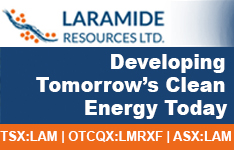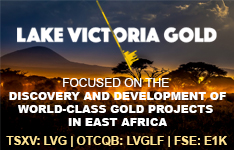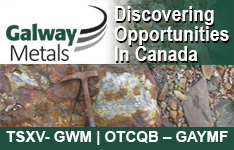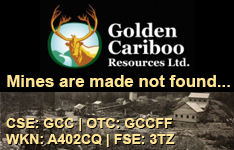 Ongoing education, excellent connections and a wealth of experience combine to give John Pugsley, editor of Stealth Investor, insights that are both compelling and provocative. He talks about the importance of patience, a focus on fundamentals and the criteria he’s using to identify the next wave of winners.
Ongoing education, excellent connections and a wealth of experience combine to give John Pugsley, editor of Stealth Investor, insights that are both compelling and provocative. He talks about the importance of patience, a focus on fundamentals and the criteria he’s using to identify the next wave of winners.The Energy Report: Your Stealth Investor focuses primarily on mining and energy, correct?
John Pugsley: Lately I’ve been more focused on prospect generation, and that includes both mining and energy. On the mining side I include everything from metals to diamonds and even phosphates used in fertilizers. On the other side, many of our discoveries are in the energy sector. Many of our discoveries are prospect generators exploring for natural gas and oil, but I should mention that I don’t limit the search only to prospect generators. We also keep our eyes out for other energy producers such as geothermal and low-head hydro.
Basically, I’m searching for companies focused on natural resources. I’m a believer that natural resources hold the ultimate values that society depends on, things that will never go out of use. The world is never going to stop using oil, gas, water, gold, copper, phosphate, etc. Therefore, companies always will need to find and produce those resources. We go in at the beginning of that process with the prospect generation. That’s why we feel so comfortable, even in the face of this credit meltdown; while it affects the debt markets, the real values are in things that human beings are going to consume. They’ll always be needed.
TER: Are you rebalancing your portfolio in light of what you see ahead in the next couple of years?
JP: No, I don’t really move from one sector to another. I just look across the board for deeply undervalued companies. I don’t care what they’re searching for or producing, whether it’s hydroelectric or phosphate or copper or gold. The attributes they need to be successful are common to all companies: how well their people have done in the past, how much cash they have, their size, their current resources, their balance sheets, and their objectives.
Most importantly, I focus on nano- and micro-cap companies that are small enough to be under the radar of the big funds and investment brokerage firms. We’re finding companies that few people know about. In fact, this is why we call our newsletter the Stealth Investor. We’re looking for companies that basically are unknown to broad markets.
TER: So that’s the profile of the companies in your portfolio?
JP: It is. Our companies have to fit these various criteria. They must be practically invisible to the big markets. They must have cash. They must have proven, frugal management. And they must concentrate on natural resources. Some of our companies have grown bigger since we’ve owned them, but basically we’re looking for small companies that can grow their value in the longer term.
TER: The market has been so wild. How are investors supposed to cope with that?
JP: It’s impossible to anticipate how investors will act tomorrow or at any point in the future, so I don’t believe in short-term trading or trend following. I use a value approach, and we’re always anticipating holding a company for one to three years, or longer. It’s the approach that Graham or Buffet or Templeton perfected. You wait and sweep up under-valued bargains when no one else wants them. You buy when blood’s running in the streets. The very best time to do this is at times like these. Keep your powder dry and you hold enough cash so you can continually add to holdings as the market goes down.
I might add that I don’t believe in leveraging. The biggest mistake investors have made—and this is in all sectors—is borrowing money to invest in hopes of and magnifying their profits. It’s obvious that this is what has led to this massive crash. The companies we like are not in debt, and not dependent upon borrowing all the time to keep cash flow going. The prospect generators are cashed up and actively exploring.
TER: Any companies you're especially enthusiastic about?
JP: I’ll give you a couple of little tiny ones that we’ve recently given buy recommendations on, but since our subscribers pay a good fee for this, I don’t like to give it away. One, though, would probably be TransAtlantic Petroleum Corp. (TSX: TNP). The last time we put out a buy recommendation it was at about 25 cents. It was up 500% a couple of weeks ago, but has fallen in the last few days. It’s profoundly undervalued.
TER: What is it about Transatlantic Petroleum that continues to be intriguing?
JP: Primarily because of the areas they’re in. They’re in oil in Morocco, all of the areas surrounding the Middle East. They have exciting prospective properties, a wonderful management team and capital. In other words, they have everything going for them. Plus, and we believe in oil. So, Transatlantic fits our model.
TER: As I understand it, you have geothermal and gas in your portfolio, too. Broadly speaking, how is energy playing into your thinking as you look out over the next three to five years?
JP: Green energy has a leg up on black energy because it is politically correct. It has government backing. That said, oil and natural gas will continue to be in demand. Natural gas and oil are, of course, two different animals. Oil can be easily shipped from its source to anywhere in the world in tankers; the natural gas market is usually local, based on the need to put it through pipelines. Liquefied natural will become more and more interesting as time goes on. Natural gas prices have oscillated, like all energy prices, and with credit conditions and the recession we’re facing, both oil and gas are struggling. To the extent they can, people are going to use less of them. It’s time like these, when markets are most pessimistic that whet our appetites.
But I’m very bullish on natural gas, particularly the Canadian natural gas companies. They were hit by a tax change a year ago, which took away some of the tax benefits to investors and dried up some of their money. Those companies are sitting on a lot of excellent properties. I think they will be big winners over the next four or five years as the properties are explored and developed. The price of natural gas will go up and more pipelines will get built.
I’m certainly very bullish on geothermal, as well, because it’s almost an endless resource. We are investors in Western GeoPower Corp. (TSX.V: WGP). They are very successful, growing, exceeding their expectations on the first wells they’ve drilled, and they’re looking around the world for geothermal resources. They’ve made some great links with the real granddaddies in the geothermal business—the people in Iceland, who are perhaps the most knowledgeable experienced in world. I am a big fan of Western GeoPower.
TER: Is Western GeoPower faring any better than other companies?
JP: The price has fallen through the floor. It’s been amazing to watch, but the price decline merely makes me more enthusiastic. Western GeoPower is a terrific bargain, one of the best buys right now. They’ve got assets, cash, and are exceeding their targets in their drilling.
A lot of other companies are exploiting geothermal resources, and I’m sure many will meet our standards before long. Geothermal isn’t as dependent upon the business cycle, but it’s certainly is dependent on the credit cycle. It takes a lot of money to develop these properties, build a steam plant, etc., but once it’s producing, the cash flow is certain and stable.
TER: Any other thoughts about the energy sector?
JP: I like to diversify in the energy area because things act according to different drivers. Different aspects of the economy and of demand affect all natural gas, geothermal, low-head hydro and oil. For example, the price of geothermal stocks doesn’t move in lockstep with the energy sector; it’s more or less a local source. On the other hand, oil is a global resource and is much more affected by political machinations. When you go into natural resources, it’s wise to diversify.
TER: Do you find any particular companies in the natural gas arena especially interesting?
JP: I have a lot of natural gas companies and they’re all deliciously undervalued. The smallest energy company I have on the books is deeply undervalued, Regal Energy, LLC (REG.V). Like several others in our portfolio, it is engaged in natural gas and crude oil in the Alberta area.
TER: How do investors look at two- to three- to four-year plays when they’ve just lost 25% to 30% of their asset base?
JP: Going into these small companies such as those we’re talking about is basically speculation, but if bought at the right price, the odds are heavily in our favor—in the 2-to 4-year time frame we’re looking at. If somebody had followed all of our recommendations since we started, they would have been up 48% as of two weeks ago. I haven’t run that calculation lately, but I’m sure it’s less now. In any case, the Stealth Investor strategy has significantly outperformed the Dow and the S&P. All of the major indexes have fallen over that same period.
We’re very bullish about the future because now is the point at which we are scraping wonderful gold off the bottom of the barrel at very low cost. Inflation will be the big problem ahead, and that’s what’s going to guarantee that natural resources will be the big winner.
TER: Which brings us back to having a longer-term perspective on holding the natural resources.
JP: Yes. Don’t go into these things for the short term. That’s not even speculation—it’s gambling. But anybody who goes in and has patience will see the kind of performance on a portfolio like this that will be equal over the longer term to what somebody like Buffet or Templeton achieved. The reason? Because they did exactly the same thing. They bought in when blood was running in the streets, kept doing that year after year after year, found the things that were oversold, and bought them at deep discounts to value. And, they are patient.
TER: You’ve been preaching the patience gospel for a long time, as well as practicing it.
JP: I’ve recently written a couple of special issues of the Stealth Investor about the current market collapse, and the question of patience. They’re on the Stealth Investor website as freebies for your readers. Reading them might help them see past the hits their assets have been taking.
John Pugsley entered the investment business in the late 1960. His first book, Common Sense Economics, sold more than 150,000 hardcover copies. The second book he penned— The Alpha Strategy: The Ultimate Plan of Financial Self-Defense for the Small Investor— spent nine weeks on the New York Times’ bestseller list and is considered a standard reference on stocking up on food and household goods as a hedge against inflation. John started sharing some of what he’d learned in his newsletter, Common Sense Viewpoint, which he published for 10 years. He subsequently wrote and published John Pugsley's Journal, an investment-economic newsletter covering political, economic and investment topics. A popular speaker and talk show guest as well as a prolific author and successful investor, he is currently pouring some of his boundless energy and expertise into the Stealth Investor, a weekly stock advisory that alerts subscribers to potential investments beneath the radar of the big funds and brokerage houses.
Want to read more exclusive Energy Report interviews like this? Sign up for our free e-newsletter, and you'll learn when new articles have been published. To see a list of recent interviews with industry analysts and commentators, visit our Expert Insights page.





































